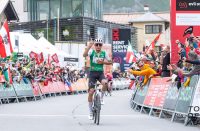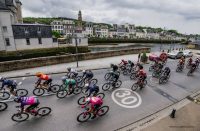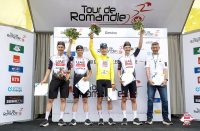Philippe Mauduit talks about his experience on stage 17 of the Vuelta when Alberto Contador won the stage
The interview showcases some of what it really means to be a sports director at a major cycling team.
What has been your greatest experience in this season?
“It’s always hard for me to choose one, when we can get as many in a year, even in a day. Like everyone else who was on the bus to the team meeting before the 17th stage of the Vuelta, I will always remember when Alberto told us he wanted to try everything to take the jersey on this day. He had a clear idea of how he would run, and Bjarne made a precise briefing. The whole team worked perfectly on the stage. The first half hour was very quick, and we had two riders in the first break, two counter-attacked and Alberto joined them. The result was the stage win and the yellow jersey after a superb effort.
It was many strong efforts in just one day. 10 km from the finish line, we were still unable to say whether Alberto would do it or not as Valverde was pretty strong as well.
I greatly appreciate having seen Rafal Majka develop during the season. He had a pretty tough start following knee surgery. I enjoyed the Tour of Beijing and the Japan Cup, where he showed progress in terms of oversight, leadership and simple strength.
A third emotionally powerful moment was when I was in China, and I got a message from our press liason, Allan Jørgensen. He talked about Nicki’s victory in Italy – the last race in Europe. Nicki gives so much to the team that he really deserves to win something. ”
What are you looking forward to most in the upcoming season?
“To achieve the goals we have, and to experience at least one victory for as many of our riders. Michael Mørkøv and Chris Anker Sorensen deserve it certainly. ”
Most people think that you’re behind the wheel of the car during the race. Can you explain what you’re doing on an average race day of the season, and what you do outside the racing season?
“It is true that we just sit behind the wheel during the race. But to sit in the car is about 1/3 of our time during a race day. I get up around 7 o’clock and eat breakfast with the staff. Sometimes, several of them are in the trucks or on the bus, so I go around and talk to them and see if everything is done according to plan. We have to adjust things, and really just talk about the next day. Then it’s time to go back to breakfast with riders and make sure that all is ok. Then it’s time to go back in the room to lock your suitcase and pay the hotel bill before we go on the road again as a big circus moves from city to city.
When we arrive at the starting area, everything goes quickly, and most people know what is going on. Guys get dressed, go out of the bus for interviews, autographs and get back on the bus to the team meeting.
When riders stand ready at the start, we take our place behind the wheel of motorcade. Our car is our office. We have everything here, road book, map, stage profile and radio to get info from organizers such as time differences, but also dangerous speed bumps or roundabouts, dangerous points, because there are a lot of people or narrow passages, and then we have the famous radio, that we communicate to riders with. Without it, we could be like a football coach keeping us in the dressing room during the match. Completely in the dark and not knowing what to do, even if your main function is to provide information.
Then two-thirds of the day is over. All cross the finish line, jump on the bus, take a shower, take fluids and food, while the bus is on its way to the hotel. When we arrive at the hotel, I plan the next day in detail, meal times, when the truck is going to the next hotel, departure and arrivals. And of course I look towards the next day and see that we have the right gear for climbing or sprinting, and I talk to all staff and ensure that everything will be clear in the right place at the right time. “Fail two plan – plan to fail”. I have to be honest – even if our day ends around 11 or 12 at night, it is made much easier with the help and the support we get from the large and professional staff we have on the team.
Time outside the racing season has become shorter as the calendar gets longer. Now we are on the road from mid-January to the end of October, and in November it is time to relax, enjoy the tranquility and looking after the family, but it is also the time for evaluation and planning for the following season. We must choose the races we want to do and keep in touch with the organizers. When you have 75 people working in a team that has 350/360 day run on five continents, you need to make sure that the right truck is in the right place at the right time with the right people. It is a job to be done before the first training camp. “Time flies again “.




